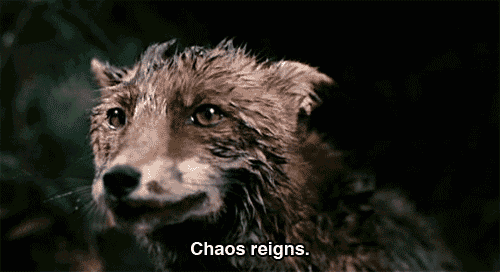Every week I highlight three newsletters that are worth your time.
If you find value in this project, do two things for me: (1) Hit the like button, and (2) Share this with someone.
Most of what we do in Bulwark+ is only for our members, but this email will always be open to everyone. To get it each week, sign up for free here. (Just choose the free option at the bottom.)
1. The Better Letter
Bob Seawright’s newsletter has the tagline “Randomness Rules.” Which is so close to meme lord Lars von Trier’s crowning achievement:
Anyway, Seawright thinks about randomness. A lot:
Arkansas was one out away from the 2018 College World Series championship, leading Oregon State in the series and 3-2 in the ninth inning of the game when Cadyn Grenier lofted a foul pop down the right-field line. Three Razorbacks converged on the ball and were in position to make a routine play on it, only to watch it fall untouched to the ground in the midst of them. Had any one of them made the play, Arkansas would have been the national champion.
Nobody did.
Given “another lifeline,” Grenier hit an RBI single to tie the game before Trevor Larnach launched a two-run homer to give the Beavers a 5-3 lead and, ultimately, the game. “As soon as you see the ball drop, you know you have another life,” Grenier said. “That’s a gift.” The Beavers accepted the gift eagerly and went on win the championship the next day as Oregon State rode freshman pitcher Kevin Abel to a 5-0 win over Arkansas in the deciding game of the series. Abel threw a complete game shutout and retired the last 20 hitters he faced.
The highly unlikely happens pretty much all the time. . . .
We readily – routinely – underestimate the power and impact of randomness in and on our lives. In his book, The Drunkard’s Walk, Caltech physicist Leonard Mlodinow employs the idea of the “drunkard’s [random] walk” to compare “the paths molecules follow as they fly through space, incessantly bumping, and being bumped by, their sister molecules,” with “our lives, our paths from college to career, from single life to family life, from first hole of golf to eighteenth.”
Although countless random interactions seem to cancel each another out within large data sets, sometimes, “when pure luck occasionally leads to a lopsided preponderance of hits from some particular direction...a noticeable jiggle occurs.” When that happens, we notice the unlikely directional jiggle and build a carefully concocted story around it while ignoring the many, many random, counteracting collisions.
As Tversky and Kahneman have explained, “Chance is commonly viewed as a self-correcting process in which a deviation in one direction induces a deviation in the opposite direction to restore the equilibrium. In fact, deviations are not ‘corrected’ as a chance process unfolds, they are merely diluted.” . . .
As Stephen Jay Gould famously argued, were we able to recreate the experiment of life on Earth a million different times, nothing would ever be the same, because evolution relies upon randomness. Indeed, the essence of history is contingency.
Randomness rules.
This is my jam. Subscribe for more random.
2. The Pull Request
We should be interested in the intersection of Cuba and tech. And we should be interested in anything Antonio García Martínez (who wrote Chaos Monkeys) has to say:
Cuba has no internet, at least not how you understand it.
Cellphones were illegal in Cuba until 2008; an American named Alan Gross who gave out a few to Cuban non-profits was sentenced to 15 years in 2011 for such heinous behavior (he served three, sprung in a 2014 prisoner swap with the US).
Since their legalization, smartphones and internet are nominally allowed, but functionally limited due to limited access and (by Cuban standards) stratospheric pricing. How a Cuban typically accesses internet is via weak and overloaded Wifi in one of a limited number of public squares, everyone sitting around and crowding by the one antenna while checking email or videocalling relatives in Miami. The nominal cost for an hour of internet in 2017, when I was there and buying the little scratch-off passes like everyone else, was $4. When you consider the real-money Cuban wage—Cubans get paid in worthless non-convertible currency, but the government charges tourists and foreign companies in hard currency—is something in the $20-$30 range, you can see how the internet is severely limited in practice. . . .
“El paquete” (the package) is a several terabyte compendium of (no shit) a week’s worth of internet on a hard drive. How your average Cuban interacts with the internet is buying a ‘paquete’ (for something around a dollar), having it copied to a USB stick or hard drive, and then browsing it offline on whatever rickety laptop or computer they have at home.
All those ‘paquetes’ are copied in one central Havana location, and then physically smuggled to all the cities in the provinces. . . . For most Cubans, the ‘internet’ is still physical media you carry around.
It gets better: Cubans also built one of the biggest ad hoc wireless networks in the world. ‘SNET’ was a wide-area mesh network built out of repurposed wireless equipment by gamers who wanted to play networked games like Call of Duty, but which soon morphed into an internal clone of the outside internet. Knockoff versions of Instagram, Facebook, etc. all sprung up, outside the control of the government. Nothing that free can last in Cuba; in 2019 the government shut the network down . . .
In Cuba, the machinery of repression has been fine-tuned to an art. The days of a political gulag numbering thousands of prisoners or dissidents getting executed en masse following show trials, as was the case shortly after the revolution, is gone. Nowadays, the first stages of the state squeezing you are relatively soft acts of repression like arresting you while doing an interview with Western media (as happened to YouTuber Dina Stars) and disappearing you for a few hours or days.
Then come the actos de repudio (‘acts of repudiation’), whereby the local members of the Comités de Defensa de la Revolución gather outside your house screaming slogans and throwing rocks is the first stage in the state’s squeezing of you. Then follow harsher steps of ostracism against you or your family, until just about everyone caves.
This whole essay is absolutely worth your time. Subscribe to AGM’s awesome newsletter.
3. Ed Zitron
Remember Clubhouse? A few months ago it was the biggest thing in tech. It was the future. Even sensible people like Ben Thompson were slobbering all over it.
I spent some time with Clubhouse and quickly came to the conclusion that this was Meerkat 2.0 . . . at best. Nothing about the platform made any sense. The only possible use-case would be as an alternative commentary feed for breaking news or live sports—and honestly, the internet has that pretty much covered. We don’t need more options. The market is not crying out for further segmentation.
Anyway, PR guy Ed Zitron has a newsletter and last week he dropped the hammer on Clubhouse:
Clubhouse, the voice app that lets you hear other people attempt to hold a conversation, is no longer invite-only, which one would imagine would have given the app a boost in downloads but has left it sitting at 930 in all free apps. People are debating whether Clubhouse’s initial success came as a result of the pandemic, but very few people seem to be saying what appears quite obvious to me - that nobody appears to be using the app. Yes, Clubhouse’s vanity metrics say that people are creating “500,000 rooms a day,” and they’ve launched a DM feature, but seriously - I am asking you, dear reader, do you know a single soul who has spent more than a few minutes on Clubhouse in the last 3 months? If you do, do they spend regular time on the app?
Opening the app today, it’s the same bewildering experience as before - Bitcoin psychos, LinkedIn hustle culture freaks and, ironically, a room called “Looking for Authentic and Genuine People on Clubhouse.” Another room “is the modern women over masculine or are men just SOFT ??” (punctuation theirs), and another promises to “MANIFEST Your Dream Car” from what appears to be a straight-up con artist . . .
The problem with any kind of network like Clubhouse is that if you aren’t retaining users, you are definitely not retaining quality users, and those users are the ones you rely upon to create rooms and attract people to your app. Live audio is tough to produce, tough to attract people to, tough to retain listeners to, and tough to keep interesting, and Clubhouse is outsourcing that to their most dedicated users - who are, it seems, somewhere between a snake oil salesman and Bitcoin maximalists. The more insular and bizarre the content creation engine is, the more unlikely it is to appeal to a wide swath of people, which makes it hard to attract creators who will do more interesting things with the platform. . . .
It is thus very weird to me that nobody is talking about the slow-motion car crash of Clubhouse, especially considering only a few months ago it was allegedly worth $4 billion. . . .
The “why everyone is talking about Clubhouse” articles may seem like (and very much be) clickbait, their popularity also likely points to the fact that nobody can justify Clubhouse’s existence. As I mentioned, social networks usually justify themselves at a minimum by giving users a body of work - a record of the stuff they’ve done - and the ability to share content, neither of which Clubhouse offers. Even if Clubhouse did offer these, they would be allowing people to listen to and share pre-recorded conversations - otherwise known as podcasts, but in a significantly more annoying form factor.
I feel like nobody actually thought about it while they went on about how big Clubhouse would be. Whenever I receive a voice note, I feel revolted - what’re you doing? Why do I have to listen to this? Why not email me? Now I have to put my damn phone to my ear and listen. Trying to make me do that with a conversation that might be important but probably isn’t is a terrible offer.
Clubhouse is the elephant in the room in venture, and I believe there is a conscious attempt to not discuss it for fear that it proves that the entire conversation around it was hot air.
If you find this valuable, please hit the like button and share it with a friend. And if you want to get the Newsletter of Newsletters every week, sign up below. It’s free.






